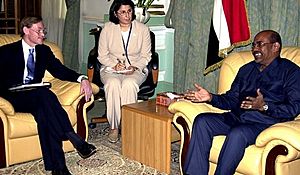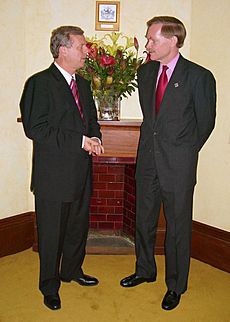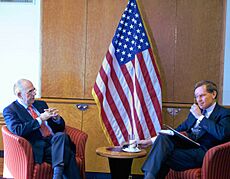Robert Zoellick facts for kids
Quick facts for kids
Robert Zoellick
|
|
|---|---|
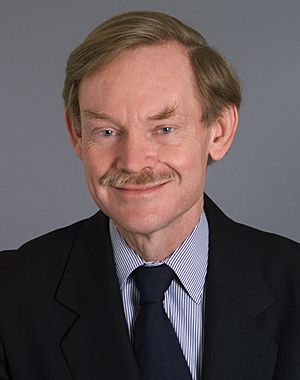
Official portrait, 2008
|
|
| 11th President of the World Bank Group | |
| In office July 1, 2007 – June 30, 2012 |
|
| Preceded by | Paul Wolfowitz |
| Succeeded by | Jim Yong Kim |
| 14th United States Deputy Secretary of State | |
| In office February 23, 2005 – June 19, 2006 |
|
| President | George W. Bush |
| Preceded by | Richard Armitage |
| Succeeded by | John Negroponte |
| 13th United States Trade Representative | |
| In office February 7, 2001 – February 22, 2005 |
|
| President | George W. Bush |
| Preceded by | Charlene Barshefsky |
| Succeeded by | Rob Portman |
| White House Deputy Chief of Staff | |
| In office August 23, 1992 – January 20, 1993 |
|
| President | George H. W. Bush |
| Preceded by | Henson Moore |
| Succeeded by | Mark Gearan |
| 12th Undersecretary of State for Economic and Agricultural Affairs | |
| In office May 20, 1991 – August 23, 1992 |
|
| President | George H. W. Bush |
| Preceded by | Dick McCormack |
| Succeeded by | Joan Spero |
| 24th Counselor of the United States Department of State | |
| In office March 2, 1989 – August 23, 1992 |
|
| President | George H. W. Bush |
| Preceded by | Max Kampelman |
| Succeeded by | Tim Wirth |
| Personal details | |
| Born |
Robert Bruce Zoellick
July 25, 1953 Evergreen Park, Illinois, U.S. |
| Political party | Republican |
| Spouse | Sherry Ferguson Zoellick |
| Education | Swarthmore College (BA) Harvard University (JD, MPP) |
Robert Bruce Zoellick (born July 25, 1953) is an American public official and lawyer. He is best known for being the 11th President of the World Bank Group. He held this important role from July 1, 2007, to June 30, 2012.
Before leading the World Bank, Mr. Zoellick served in several high-level positions in the United States government. He was the United States Deputy Secretary of State from 2005 to 2006. He also served as the U.S. Trade Representative from 2001 to 2005. He has also worked as an advisor for different organizations and in universities.
Since leaving the World Bank in 2012, Mr. Zoellick has been a senior fellow at Harvard's Belfer Center for Science and International Affairs. He also works as a Senior Counselor at Brunswick Group.
Contents
Early Life and Education
Robert Zoellick was born in Evergreen Park, Illinois, on July 25, 1953. His parents were Gladys and William T. Zoellick. He grew up in Naperville, Illinois, and finished high school at Naperville Central High School in 1971.
After high school, Mr. Zoellick went to Swarthmore College. He studied history and earned his Bachelor of Arts degree in 1975. Later, he attended Harvard University. There, he studied both public policy and law. He received his law degree (Juris Doctor) from Harvard Law School and a Master of Public Policy from the Harvard Kennedy School in 1981.
Career in Public Service
Robert Zoellick has had a long career helping the U.S. government and international organizations.
Early Government Roles (1985–1992)
Mr. Zoellick started working in government in 1985. He was a special assistant at the Treasury Department. Later, he became a counselor to the United States Secretary of the Treasury, James Baker.
He also helped with the 1988 presidential campaign for George H. W. Bush. When Bush became president, Mr. Zoellick continued to work closely with James Baker, who was then the Secretary of State. He served as a counselor and later as an Under Secretary of State, focusing on economic and agricultural affairs.
Mr. Zoellick was also the U.S. representative, sometimes called a "sherpa," for the G7 Economic Summits in 1991 and 1992. He played a key role in talks about German reunification. For his efforts, Germany gave him a special award called the Knight Commander's Cross of the Order of Merit. He also helped with the creation of NAFTA, a trade agreement. In 1992, he became the White House Deputy Chief of Staff.
Work in Business and Academia (1993–2001)
After his time in government, Mr. Zoellick worked in different fields. From 1993 to 1997, he was an Executive Vice President at Fannie Mae. He also taught at the United States Naval Academy and was a research scholar at Harvard University.
He also advised Goldman Sachs, a large financial company, on international matters. He was a member of the board of directors for the Council on Foreign Relations. He also advised George W. Bush during his 2000 presidential campaign.
U.S. Trade Representative (2001–2005)
In 2001, President George W. Bush chose Robert Zoellick to be the U.S. Trade Representative. This meant he was in charge of trade negotiations for the United States.
During this time, he helped China and Taiwan join the World Trade Organization (WTO). He also worked to start new global trade talks in Doha, Qatar. He helped pass trade agreements with Jordan and Vietnam. He also worked with Congress to pass the Trade Act of 2002, which gave the President new authority for trade promotion.
Mr. Zoellick also played a role in a dispute with the European Union about genetically modified foods. He argued that the EU's rules on these foods were against WTO rules. He believed that biotech food could help feed people and protect the environment.
Deputy Secretary of State (2005–2006)
In 2005, Mr. Zoellick became the United States Deputy Secretary of State. This is the second-highest position in the U.S. Department of State.
He had a big impact on the Bush administration's policies toward China. He encouraged China to become a "responsible stakeholder" in the world, meaning it should help maintain global stability.
Mr. Zoellick was also the main person for the Bush administration working on the Darfur conflict peace process in Sudan. He traveled to Sudan multiple times to encourage peace talks and helped create the 2006 Darfur Peace Agreement. He left this role in June 2006 to return to Goldman Sachs.
President of the World Bank (2007–2012)
On May 30, 2007, President George W. Bush nominated Robert Zoellick to become the President of the World Bank. He officially started this role on July 1, 2007.
During his time at the World Bank, Mr. Zoellick focused on several key areas. He worked to help the poorest countries, especially in Africa, overcome poverty and grow. He also helped countries recovering from conflict. The World Bank increased its lending to help countries deal with the global financial crisis.
He also worked to get more resources for the International Development Association (IDA), which provides loans to the poorest countries. He also made changes to the World Bank's structure to give developing countries more influence in its decisions. Mr. Zoellick also promoted the use of open data and addressed climate change. He finished his term as president on June 30, 2012.
Later Career and Advisory Roles
After leaving the World Bank, Mr. Zoellick became a senior fellow at Harvard Kennedy School's Belfer Center for Science and International Affairs in July 2012. He also served as Chairman of International Advisors to Goldman Sachs.
In 2012, he was chosen to lead the national security part of Republican candidate Mitt Romney's team during the presidential election.
Mr. Zoellick is a member of several important groups, including the Council on Foreign Relations and the Trilateral Commission. He also chairs the Global Tiger Initiative, which works to protect tigers. He is a member of the Global Leadership Council of Mercy Corps, a humanitarian organization.
He has served on the boards of directors for various organizations, including the Peterson Institute for International Economics and the Carnegie Endowment for International Peace. In 2017, he joined Brunswick Group, a public affairs firm. Since 2020, he has chaired Standard Chartered's international advisory council. He has also been an independent director of Robinhood since 2021.
He is a trustee of the Wildlife Conservation Society and has advised the World Wildlife Fund.
Honors and Awards
Robert Zoellick has received many awards for his public service. These include the Secretary's Distinguished Service Award from the Department of State and the Alexander Hamilton Award from the Department of the Treasury. He also received the Medal for Distinguished Public Service from the Department of Defense.
In 1992, he was given the Knight Commander's Cross of the Order of Merit of the Federal Republic of Germany for his work on German reunification. He also received honorary degrees and top honors from the Mexican and Chilean governments for his work on free trade and development. In 2016, he received the Annenberg Award for Excellence in Diplomacy.
Views and Ideas
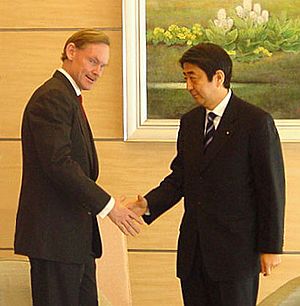
In a 2000 essay, Mr. Zoellick talked about five key ideas for U.S. foreign policy. These included respecting power, building alliances, working with international groups, using new technologies, and being aware of challenges from those who oppose American values. He emphasized that the United States must be strong to face these challenges.
He also suggested that the Group of 20 (G20) leading economies should think about using a global reserve currency based on gold. This idea was part of his thoughts on how to improve the world's financial system.
Mr. Zoellick is the author of the 2020 book, America in the World: A History of U.S. Diplomacy and Foreign Policy. In this book, he explains that U.S. foreign policy has always been shaped by five main traditions: focusing on North America, trade and technology, alliances, public support, and America's purpose in the world.
Personal Life
Robert Zoellick married Sherry Lynn Ferguson in 1980. They live in McLean, Virginia.
See also
 In Spanish: Robert Zoellick para niños
In Spanish: Robert Zoellick para niños
- 2008–2009 Keynesian resurgence
 | Shirley Ann Jackson |
 | Garett Morgan |
 | J. Ernest Wilkins Jr. |
 | Elijah McCoy |


